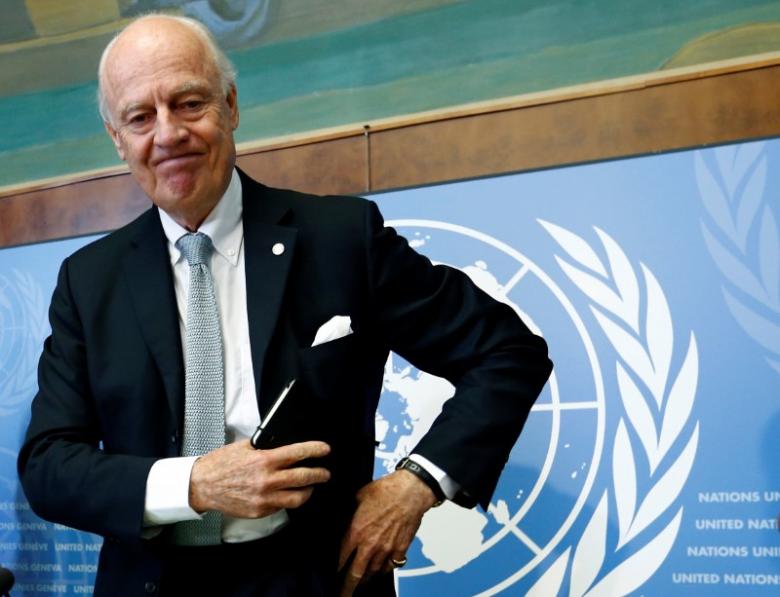Geneva – U.N. Special Envoy for Syria Staffan de Mistura successfully prevented on Thursday the failure of the fourth round of intra-Syrian talks in Geneva, after he convinced representatives of the Syrian opposition factions to sit together as a unified delegation at the opening session, which was delayed from 3 till 7 pm.
Representatives from the opposition groups sat on the left of the international enjoy, where a large table was dedicated to the main opposition bloc – the High Negotiations Committee (HNC) – and two smaller tables were reserved for the two other groups – the Moscow and the Cairo platforms.
Representatives from the U.N. Security Council and the Friends of Syria Group attended the opening session, which saw only a speech by de Mistura.
“I ask you to work together. I know it’s not going to be easy to end this horrible conflict and lay the foundation for a country at peace with itself, sovereign and unified,” de Mistura told both pro-regime and opposition delegations, who sat on opposite sides of the stage.
“It is your opportunity and solemn responsibility… not to condemn future generations of Syrian children to long years of bitter and bloody conflict,” he added.
“The Syrian people desperately all want an end to this conflict and you all know it,” he continued.
“You are the first ones to tell us it. They are waiting for a relief from their own suffering and dream of a new road out of this nightmare to a new and normal future in dignity,” the international envoy also said.
De Mistura described the negotiations as a difficult task, adding that they would center on U.N. Security Council resolution 2254, which calls for a new constitution, U.N.-supervised elections and transparent and accountable governance.
He said the feeble ceasefire brokered by Russia, Turkey and Iran had opened a window of opportunity.
“The effort has jump-started the process … to see if there is a political road forward and we don’t want to miss this opportunity,” he stressed.
An atmosphere of ambiguity surrounded Thursday’s opening session, which was delayed following disputes between the HNC and de Mistura over the structure of the opposition delegation.
The dispute was partly due to the international envoy’s inclusion of two other groups – the Moscow and the Cairo platforms – in the talks. The envoy invited the two pro-Russia, regime-tolerated opposition groups to sit separately from the HNC.
Western sources told Asharq Al-Awsat newspaper that they have “advised” the main opposition group to stay in Geneva “whatever happened” and that they have received “reassurances” in this regard.
The sources added that they have urged the opposition to focus on the transitional plan that it has presented last September during the London meetings on Syria.
For his part, Russia’s envoy to the U.N. in Geneva Alexei Borodavkin underlined to necessity to fully implement Resolution 2254, including the clause pertaining to fighting terrorism.
In comments to Asharq Al-Awsat, member of the Cairo platform Jamal Suleiman explained that disagreements between the opposition delegations were also due to a dispute over the formation of three committees that would be in charge of studying the “political transition process” as stipulated in Resolution 2254.
European sources told Asharq Al-Awsat that the current weaknesses in the opposition were mainly due to the ambiguity in the U.S. position towards the Syrian file, awaiting a clear stance by President Donald Trump’s administration on this matter.
